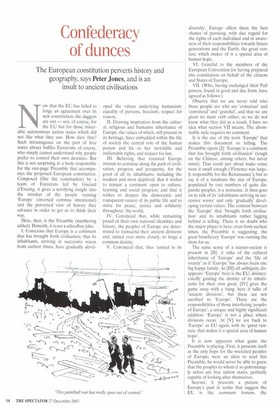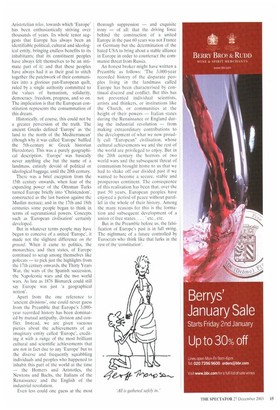Confederacy of dunces
The European constitution perverts history and geography, says Peter Jones, and is an insult to ancient civilisations
Now that the EU has failed to forge an agreement over its new constitution, the daggers are out — not, of course, for the EU but for those miserable autonomous nation states which did not like what they saw. How dare they! Such intransigence on the part of free states always baffles Eurocrats, of course, who simply cannot understand why people prefer to control their own destinies. But this is not surprising in a body responsible for the one-page Preamble that accompanies the proposed European constitution. Composed (like the constitution) by a team of Eurocrats led by Giscard d'Estaing, it gives a terrifying insight into the mindset of the people running 'Europe (inverted commas intentional) and the perverted view of history they advance in order to get us to think their way.
Here, then, is the Preamble (numbering added). Honestly, it is not a schoolboy joke:
I. Conscious that Europe is a continent that has brought forth civilisation; that its inhabitants, arriving in successive waves from earliest times, have gradually devel oped the values underlying humanism: equality of persons, freedom, respect for reason,
II. Drawing inspiration from the cultural, religious and humanist inheritance of Europe, the values of which, still present in its heritage, have embedded within the life of society the central role of the human person and his or her inviolable and inalienable rights, and respect for law,
III. Believing that reunited Europe intends to continue along the path of civilisation, progress and prosperity, for the good of all its inhabitants, including the weakest and most deprived; that it wishes to remain a continent open to culture, learning and social progress; and that it wishes to deepen the democratic and transparent nature of its public life and to strive for peace, justice and solidarity throughout the world, IV. Convinced that, while remaining proud of their own national identities and history, the peoples of Europe are determined to transcend their ancient divisions and, united ever more closely, to forge a common destiny, V. Convinced that, thus `united in its diversity', Europe offers them the best chance of pursuing, with due regard for the rights of each individual and in awareness of their responsibilities towards future generations and the Earth, the great venture which makes of it a special area of human hope, VI. Grateful to the members of the European Convention for having prepared this constitution on behalf of the citizens and States of Europe, VII. (Who, having exchanged their Full powers, found in good and due form, have agreed as follows:) Observe that we are never told who these people are who are 'conscious' and 'convinced' and `grateful', and that we are given no main verb either, so we do not know what they did as a result. I have no idea what section VII means. The abominable style requires no comment.
It is the use of the term 'Europe' that makes this document so telling. The Preamble opens [I]: 'Europe is a continent that has brought forth civilisation' (tough on the Chinese, among others, but never mind). That could just about make sense were it small enough ('Florence was largely responsible for the Renaissance'); but to say it of a landmass the size of Europe, populated by vast numbers of quite disparate peoples, is a nonsense. It then goes on to talk of its 'inhabitants arriving in successive waves' and only `gradually' developing certain values. The contrast between the `Europe' that 'brought forth civilisation' and its inhabitants rather lagging behind is telling. There is no doubt who the major player is here: even from earliest times, the Preamble is suggesting, the great beneficiary 'Europe' was running the show for us.
The same sense of a master-society is present in [II]: it talks of the cultural inheritance of 'Europe' and the 'life of society' as if 'Europe' has always been one big happy family. At [III] all ambiguity disappears: `Europe' here is the EU, disinterestedly guiding the destiny of its inhabitants for their own good. [IV] gives the game away with a bang: here it talks of 'ancient divisions', but these are not ascribed to 'Europe'. These are the responsibilities of those interfering 'peoples of Europe', a unique and highly significant addition: 'Europe' is not a place where divisions occur. At [V] we are back to 'Europe' as EU again, with its 'great venture, that makes it a special area of human hope'.
It is now apparent what game the Preamble is playing. First, it presents itself as the only hope for the wretched peoples of Europe; were an alien to read this Preamble, he would never be able to guess that the peoples to whom it so patronisingly refers are free nation states, perfectly capable of looking after themselves.
Second, it presents a picture of Europe's past in terms that suggest the EU is the summum bonum, the
Aristotelian telos, towards which 'Europe' has been enthusiastically striving over thousands of years. Its whole tenor suggests that Europe has always been an identifiable political, cultural and ideological entity, bringing endless benefits to its inhabitants; that its constituent peoples have always felt themselves to be an intimate part of it: and that these peoples have always had it as their goal to stitch together the patchwork of their communities into a glorious pan-European quilt, ruled by a single authority committed to the values of humanism, solidarity, democracy, freedom, progress, and so on. The implication is that the European constitution represents the consummation of this dream.
Historically, of course, this could not be a greater perversion of the truth. The ancient Greeks defined 'Europe' as 'the land to the north of the Mediterranean' (though why it was called 'Europe' baffled the 5th-century BC Greek historian Herodotus). This was a purely geographical description. 'Europe' was basically never anything else but the name of a landmass, entirely devoid of political or ideological baggage, until the 20th century.
There was a brief exception from the 15th century onwards, when fear of the expanding power of the Ottoman Turks turned Europe briefly into 'Christendom', constructed as the last bastion against the Muslim menace; and in the 17th and 18th centuries some people began to think in terms of supranational powers. Concepts such as 'European civilisation' certainly developed.
But in whatever terms people may have begun to conceive of a united 'Europe', it made not the slightest difference on the ground. When it came to politics, the monarchies, and then states, of Europe continued to scrap among themselves like polecats — to pick just the highlights from the 17th century onwards, the Thirty Years War, the wars of the Spanish succession, the Napoleonic wars and the two world wars. As late as 1876 Bismarck could still say Europe was just 'a geographical notion'.
Apart from the one reference to 'ancient divisions', one could never guess from the Preamble that Europe's 3,000year recorded history has been dominated by mutual antipathy, division and conflict. Instead, we are given vacuous pieties about the achievements of an imaginary entity called 'Europe', crediting it with a range of the most brilliant cultural and scientific achievements that are not in fact due to any 'Europe' but to the diverse and frequently squabbling individuals and peoples who happened to inhabit this part of the world at the time — the Homers and Aristotles, the Newtons and Bachs, the Italians of the Renaissance and the English of the industrial revolution.
Even less could one guess at the most thorough suppression — and exquisite irony — of all: that the driving force behind the construction of a united Europe in the past 60 years was not France or Germany but the determination of the hated USA to bring about a stable alliance in Europe in order to counteract the communist threat from Russia.
An honest broker might have written a Preamble as follows: 'The 3,000-year recorded history of the disparate peoples living in the landmass called Europe has been characterised by continual discord and conflict. But this has not prevented individual scientists, artists and thinkers, or institutions like the Church, or communities at the height of their powers — Italian states during the Renaissance or England dur ing the industrial revolution from making extraordinary contributions to the development of what we now proudly call "European" civilisation, whose cultural achievements we and the rest of the world are privileged to enjoy. But in the 20th century the horrors of two world wars and the subsequent threat of communism brought home to us that we had to shake off our divided past if we wanted to become a secure, stable and prosperous continent. The consequence of this realisation has been that, over the past 50 years, European peoples have enjoyed a period of peace without parallel in the whole of their history. Among the many reasons for this is the formation and subsequent development of a union of free states. . . . ' etc., etc.
But in the Preamble before us, the falsification of Europe's past is in full swing. The nightmare of a future controlled by Eurocrats who think like that lurks in the rest of the 'constitution'.



























































 Previous page
Previous page